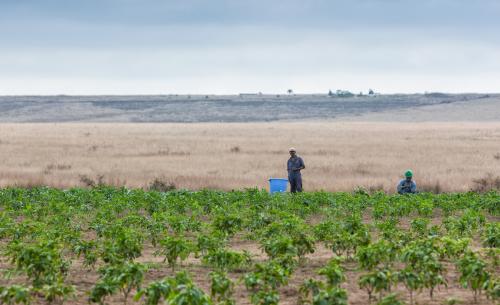In “Water Crimes: a Global Crisis on the Rise,” a lecture given on February 20, 2015 at Brookings Mountain West Lecture Series, Vanda Felbab-Brown explains that urbanization, population growth, environmental degradation, water pollution, climate change, and increased living standards are some of the main reasons for intense competition for water. As surface water depletes, there is increased pressure for ground water usage, which is more difficult to regulate for use, abuse, and theft. Water theft and smuggling are perpetrated by both the wealthy and those who are chronically deprived of water, says Felbab-Brown, as she provides examples from California, southern Europe, Nigeria, Kenya, the Middle East, and South Asia. In many parts of world, elaborate smuggling of water with complex network chains and water mafias has emerged. Smuggling modes vary and among others include the development of illegal pipelines, illegal truck deliveries as well as the cooptation of water regulators complicit in licensing fraud and broader government acquiescence to illegal water delivery. Illegally sourced and smuggled water is used for personal consumption, agriculture, industry, and sometimes for other other illegal activities, such as the production of illegal narcotics.
For many reasons, the illegal use and delivery of water is difficult to address, says Felbab-Brown. Large-scale agriculture and industry often exercise great influence over regulators and law enforcement. In slum areas, mostly unconnected to legal pipelines, the suppression of illegal water distribution can sever access to water and hence threaten the physical survival of the most marginalized and poor. Across the world, citizens tend to be vehemently opposed to increased water pricing. Yet without effective regulation, appropriate pricing, and suppression of water crimes, the sustainability, long-term viability, and inclusive and equitable use of water cannot easily be achieved.
Among the ways to improve water policy and suppress water smuggling, Felbab-Brown notes: (1) Recognizing the extent of water misuse, abuse, and crimes; (2) developing better inventories and water-level monitoring capacity, better regulation, including pricing, greater transparency, and a broadly-based external oversight of water authorities; (3) increasing stakeholder-participation of water regulation, including farmers, businesses, and the poor who are traditionally excluded; and (4) selectively licensing some currently illegal water distributors to areas without legal water distribution systems while cracking down on the most usury, unreliable, and abusive ones. Looking ahead, coping with scarcity will require not just more innovation, but particularly better conservation.
<
/p>



Commentary
Water Crimes: A Global Crisis on the Rise
February 20, 2015